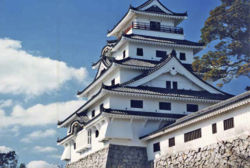Dochi ga ii ka yoku wakaranai - I don't know which one will be better
Towards Better Japanese
Ganbatte ne!
Do Your Best!
Makurasuki
Dec 28, 2008
Dec 23, 2008
Xmas in Japan
Christmas in Japan is no such thing. The closest thing the Japanese have to X-mas is their tradition of eating X-mas cake. Do they believe also in a Sandy Claus? Just about as much as people in the US believe in him.
Towards Better Japanese
Ganbatte ne!
Do Your Best!
Makurasuki
Towards Better Japanese
Ganbatte ne!
Do Your Best!
Makurasuki
Dec 20, 2008
A so ne? A sayo^ desu ka.
A so ne? - Is that so? ( but insinuating to one's self with the ne)
A so^ desu ka? Is that right?
sayo^ = so^
so that
A sayo^ de gozaimasu ka can be used instead of A so^ desu ka when wanting to talk in ultra polite language.
To desu ka - used with base II of a verb as in
ikiyo^to^ desu ka? You are going?
Hakata dialect.
Towards Better Japanese
Ganbatte ne!
Do Your Best!
Makurasuki
A so^ desu ka? Is that right?
sayo^ = so^
so that
A sayo^ de gozaimasu ka can be used instead of A so^ desu ka when wanting to talk in ultra polite language.
To desu ka - used with base II of a verb as in
ikiyo^to^ desu ka? You are going?
Hakata dialect.
Towards Better Japanese
Ganbatte ne!
Do Your Best!
Makurasuki
Labels:japanese vocabulary
learn japanese,
learning japanese,
study japanese japan,
study language
Dec 18, 2008
A Snack in Japan
When I hear the word, "snack", I think of things you can eat, or snack on. In Japan the word snack has an altogether different meaning. If you were to say, "snack" to a Japanese person, they would think you were talking about the local bar, where you have a chance to get to know everyone's names. In Japan, a snack, or スナック is a night club, or a bar. It is not a Dorito, or a Frito, peanuts or popcorn. A snack bar is a place where you can maintain a personal tab, so you can drink now, and pay later. You can even buy your own personal bottle of whiskey or brandy (although at a much heftier price than buying it yourself), keep it at the bar, and drink from it everytime you go to the bar. Once you buy your bottle though, you are as good as in the club.
Snack - スナック - night club or bar in Japan
Snack - スナック - night club or bar in Japan
Dec 15, 2008
Japanese grammar - Japanese Intensifiers
Intesifiers in Japanese
Japanese intensifiers
Put a Japanese verb into its extensor form, Base II, then add + any of these to make the verb easy or hard to perform:
1. yasui – easy; simple
2. tsurai – hard to deal with, handle; hardship; difficult.
3. nikui – difficult;hard
1a. add yasui to yaru
やりやすい – yariyasui - easy to play, do
1b. add yasui to suru
しやすい – shiyasui - easy to do
1c. add yasui to taberu
食べやすい - tabeyasui – easy to eat
1d. add yasui to noru
乗りやすい - noriyasui– easy to ride
2a. add tsurai to suru
しづらい - hard to do
2b. add tsurai to yaru
やりづらい - hard to play, do
3a. add nikui to hiku
引きにくい – hikinikui - hard to play, or pull
3b. add nikui to hanasu
話しにくい– hanashinikui - hard to speak
3c. add nikui to miru
見にくい– Minikui - hard to look at; ugly
* tsu becomes dzu or zu when compounded
or しづらい not しつらい.
dzu not tsu after the shi in shidzurai (shizurai). Yarizurai – hard to do, shitsurai or shizurai – hard to do*
Japanese intensifiers
Put a Japanese verb into its extensor form, Base II, then add + any of these to make the verb easy or hard to perform:
1. yasui – easy; simple
2. tsurai – hard to deal with, handle; hardship; difficult.
3. nikui – difficult;hard
1a. add yasui to yaru
やりやすい – yariyasui - easy to play, do
1b. add yasui to suru
しやすい – shiyasui - easy to do
1c. add yasui to taberu
食べやすい - tabeyasui – easy to eat
1d. add yasui to noru
乗りやすい - noriyasui– easy to ride
2a. add tsurai to suru
しづらい - hard to do
2b. add tsurai to yaru
やりづらい - hard to play, do
3a. add nikui to hiku
引きにくい – hikinikui - hard to play, or pull
3b. add nikui to hanasu
話しにくい– hanashinikui - hard to speak
3c. add nikui to miru
見にくい– Minikui - hard to look at; ugly
* tsu becomes dzu or zu when compounded
or しづらい not しつらい.
dzu not tsu after the shi in shidzurai (shizurai). Yarizurai – hard to do, shitsurai or shizurai – hard to do*
Dec 1, 2008
Japanese grammar tame ni additional uses
Tame ni can also be used in past tense to mean because of something; for example
byo^ki ni natta tame - because he got sick etc otherwise I always considered tame ni more to mean for the sake of; for example
gakko no tame ni - for the school's sake
okaasan no tame - for mom
byo^ki ni natta tame - because he got sick etc otherwise I always considered tame ni more to mean for the sake of; for example
gakko no tame ni - for the school's sake
okaasan no tame - for mom
Its dangerous - Abunai
abunai
abunai da
abunai desu
abuno^gozaru
abuno^gozaimasu
o abuno^gozaimasu
bonus sentence - ancient Japanese grammar
base I + zaru bekarazu
iku in base I = ika
ika +zaru bekarazu
ikazaru bekarazu! - must go!
Towards Better Japanese
Ganbatte ne!
Do Your Best!
Makurasuki
Subscribe to:
Posts (Atom)

